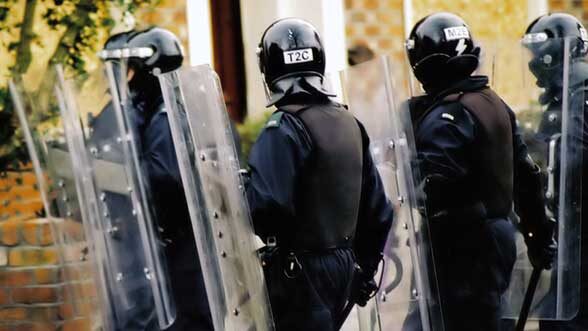Law enforcement increasingly intolerant of dissent
“What people in the media and what policymakers mean when they talk about militarization of the police is basically what we’re seeing on the nightly news: images of police officers standing atop armored personnel vehicles and training assault rifles on protesters,” says Joy Rohde, assistant professor of public policy at the Gerald R. Ford School of Public Policy. “What we’re really seeing are police officers who are acting like and looking like soldiers rather than officers of the peace.”
Rohde is the author of Armed with Expertise: The Militarization of American Social Science Research During the Cold War (Cornell University Press, 2013). She argues that militarized police departments lead to violent confrontations with protesters and that, when this happens, “we lose space for dissenters and protesters to engage in the democratic process.”
The roots of police militarization, Rohde explains, are in the 1033 program, an arm of the Defense Department set up in 1997 to provide military equipment, among other supplies, to police departments.
Originally part of the War on Drugs, this program has led to militarization of police departments outside of drug enforcement contexts, setting the stage for police violence during the WTO protests in Seattle in 1999, during Occupy Wall Street in 2011, and now during the protests in Ferguson, Mo.
“Of course, it’s very clear that when people get this gear they tend to want to use it,” Rohde says.
She calls for the end of the 1033 program, but argues that “we need a much more thorough-going, long-term engagement with how police perceive protests, how police perceive dissent.”
Policy Points is a video series featuring short segments on current events or recent research by faculty from the Gerald R. Ford School of Public Policy.




Norman Andresen - 1976 Rackham
What a very interesting contribution. As we fragment our society into various groups of specilaized interest, we loose the sense of a greater community and start to define ourselves as the good and the ‘other’ as undesirable to be avoided or even attacked in various ways. This happens throughout society and when the police adopt this attitude we see on the nightly news the implementation of this them vs. us mentality. The loss of the freedom to protest is a dangerous movement in society and something wen need to be greatly concerned about.
Reply
Edward Marks - 1956
Not only a pertinent comment, but one with an interesting history. Prior to the British innovation of the unarmed civilian police force (the “Bobby”), policing was done everywhere by the military, often by specialized units such as the French Gendarmes. We now appear to be reversing that trend, and returning to military policing of our civilian society.
Reply
Rober Goedjen - 1955
Let us be clear that this response comes from the experience of crowds out of control , looting, damaging property and injuring people. Many of these protests are very well organized and financed. The response first should be protection of property and innocent bystanders. In many cases this does require force.. Because you might protest and draw the media does not mean you are right. Let us be careful we don’t confuse the right to free speech and the right to riot.. Governments are there to protect the citizens and everyone’s rights. we should appreciate that first.
Reply
Elinor Reading - 1962
Believe me, sir, there was no crowd of protesters when my husband and I tried to line up at the tiny ferry terminal in Marine City, MI, on Aug. 10. We weren’t out of control, but we got our first taste of what Ms. Rohde is talking about. Realizing our car was in the wrong lane; we tried to line up behind the only other vehicle there. First thing we knew, two guys in black ran out of nowhere and took the same spread-legged stance in front of our vehicle, their hands poised near their weapons. Each screamed, over and over, the same words: “What do you think you’re doing?” Each shouted down our respectful reply that we were returning to Toronto from a 50th wedding party in Ann Arbor (my U-M roommate’s). As a born Detroiter who married a Canadian, I’m aware U.S. border guards can be rude, but this attack — it looked like one; it felt like one — was something new. These guys clearly had been trained, as Ms. Rohde says, to act like soldiers. And trained for nothing else. After they’d amused themselves scaring us, they consented to look at the roommate’s invitation, but they asked none of the probing questions I”d expect if they’d really had any suspicions of us. Sir, I don’t want my U.S. income tax squandered on teaching young men to pretend they’re action figures in a video game. You don’t get security by intimidating people at random.
Reply